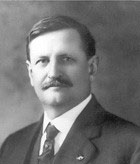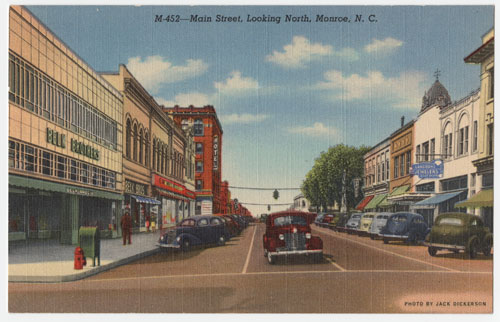2 June 1862–21 Feb. 1952

William Henry Belk, merchant, was born in Lancaster County, S.C., of English and Scottish ancestry. His father was Abel Nelson Washington Belk, a farmer, who was drowned by Sherman's raiders in 1865 for refusing to divulge the whereabouts of his father's gold mine. His mother was Sarah Narcissus Walkup.
Belk received his first education at home from his mother, who had been educated at Carolina Female Academy in Ansonville. Later he attended the local one-room schoolhouse. In 1873 the family moved to Monroe, and Belk attended school there and in nearby Mecklenburg County. He could not afford to attend college.
At the age of fourteen, Belk went to work in a dry goods store at a salary of five dollars a month. After eleven years he had become head man in the store. The next year, when he was twenty-six years old, he decided to establish his own business. With $750 he had saved, $500 borrowed at 10 percent interest, and $3,000 worth of merchandise for which he traded, Belk opened a store in Monroe on 29 May 1888. He called his store the "New York Racket," liking the name because it "sounded big." A little more than six months later, with the slogan "Belk Sells It for Less," he had paid off the money he had borrowed, covered his expenses, and made a clear profit of $3,100. Three years later he persuaded his brother, John Montgomery, a practicing physician, to give up his profession and join in the mercantile venture. They worked as a team from that time until the death of Dr. Belk in 1928.
Several of Belk's policies were unique at the time. Merchandise was clearly marked and was sold at the price marked; there was no haggling at the counter. If a customer bought an article, took it home, and found that it was not what he wanted, he could return it and get his money back. In addition to these innovations, he introduced another merchandising idea that was far more radical: he sold for cash only. Therefore, he had no accounts to record, no notes to accept, no mortgages on farm crops and animals to foreclose, and no customers distressed and angry because he had dispossessed them of their property. The business continued to grow, not spectacularly, but steadily. There was no work about the store that he did not do, and he demanded more of himself than of any of those who worked for him.

In 1882, Belk opened a second store, this time in Chester, S.C. A year later he opened another in Union, S.C. On 25 Sept. 1895, the Belks opened a store in Charlotte and called it Belk Brothers Company. As the years went on, new Belk stores began to appear throughout the Southeast. Belk watched constantly for promising young men who were honest, willing to work, and striving for a chance. By linking his name and his support to each business, he helped it to become successful in its home community. The training of so large a number of good solid businessmen in many communities was one of the great services Belk rendered. Today, there are some four hundred Belk and Belk-related stores in seventeen southeastern states and Puerto Rico.
One of Belk's finest innovative achievements was the development of a centralized buying service. Such a service enabled each store to have the benefit of the advice of purchasing specialists in every merchandising area. This technique has been extended to other aspects of retailing and now all Belk stores have direct access to specialists not only in merchandising, but also in personnel recruitment and management, accounting and auditing, real estate planning, construction and financing, architectural and interior planning and design, traffic management, labeling and packaging, printing and advertising, benefits and compensation, and legal matters and financial planning. Belk Stores Services, Inc., with offices in Charlotte and New York City, employs nearly a thousand such specialists and is the end result of one aspect of Belk's merchandising genius.
Belk was not socially active and certainly not politically oriented. Although he voted the Democratic ticket, he had serious doubts about New Deal legislation and looked with horror upon any political system resembling a welfare state. He was a member of the Scottish and York Rite Masons and the Order of the Mystic Shrine.
Belk was a devout member of the Presbyterian church. He was greatly interested in Presbyterian Junior College in Maxton, and he contributed heavily to its work. Other special interests included Presbyterian Hospital in Charlotte and the Presbyterian Orphans' Home at Barium Springs. He and his brother John established a hospital in Tai-Chow, China, known as the "Sarah Walkup Belk Memorial Hospital" in honor of their mother. Through the John M. Belk Memorial Fund, he assisted some 335 churches and manses in their building programs. Portions of the store profits and of his personal income were used for these and other philanthropic purposes.
On 9 June 1915, Belk married Mary Lenora Irwin, and to them were born six children: William Henry, Jr., Sarah, John Montgomery, Irwin, Henderson, and Thomas Milburn.
Belk died in Charlotte and was buried in Elmwood Cemetery there. Several fine portraits exist, which are displayed in Charlotte at the offices of Belk Stores Services, Inc.